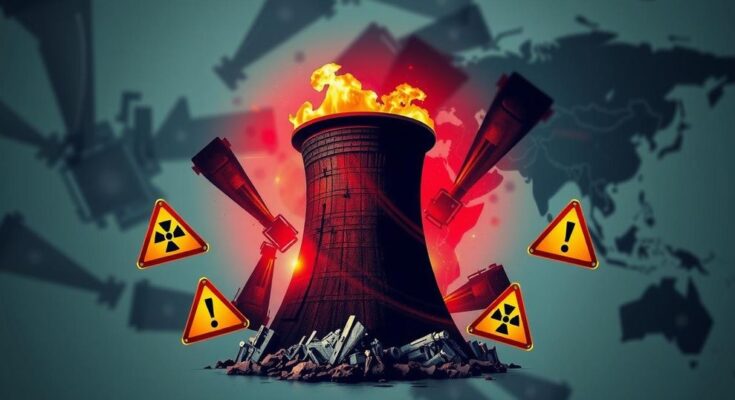Iranian Vice President Mohammad Javad Zarif accused Israel of committing “nuclear terrorism” by rigging the Natanz uranium enrichment site with explosives. This statement, confirming Israeli involvement in a 2021 incident that damaged thousands of centrifuges, highlights the impact of sanctions on Iran’s security vulnerabilities and its reliance on intermediaries. Zarif emphasized the broader implications of these sanctions on Iran’s technological capabilities and security posture.
On Tuesday, Iranian Vice President Mohammad Javad Zarif asserted during the online news program Hozour that Israel had engaged in an act of “nuclear terrorism” by rigging a uranium enrichment facility with explosives. This accusation pertains to an incident in April 2021 at the Natanz site, where an underground power substation was damaged, resulting in serious harm to thousands of centrifuges. Reports indicated that the attack was executed via a concealed explosive device, remotely detonated at the facility, despite Iranian officials claiming it was not an external attack but rather the work of an internal traitor.
Zarif’s remarks represent the first acknowledgment from the Iranian government regarding Israeli involvement in the attack. Historically, Israel has been implicated in targeting Iran’s nuclear capabilities, notably during the Stuxnet cyberattacks, which exploited vulnerabilities in security systems to inflict damages on numerous reactors.
The Vice President elaborated on the broader implications of sanctions imposed on Iran, stating that such restrictions have forced the country to rely heavily on intermediaries. This reliance has led to significant security vulnerabilities, which he claims were exploited by Israeli operatives. Zarif emphasized that infiltration by the Zionist regime into even one intermediary could facilitate serious security breaches, which he argued was precisely what occurred in this instance.
Moreover, Zarif noted that the sanctions have had adverse effects beyond financial constraints, severely impairing Iran’s ability to acquire essential technology needed to bolster its infrastructure. He drew parallels between this incident and past Mossad operations against Hezbollah, which resulted in numerous casualties due to detonated communication devices and highlighted the severity of these threats on Iranian sovereignty and safety.
The recent accusations made by Iranian Vice President Mohammad Javad Zarif arise from a series of longstanding tensions between Iran and Israel concerning nuclear capabilities. This conflict has seen various methods of sabotage employed by Israel, including cyberattacks and reported physical assaults on nuclear infrastructure. The Natanz uranium enrichment site, specifically, has been a focal point of these confrontations, raising international concerns over nuclear proliferation in the region and prompting both defensive and retaliatory measures from both nations. Sanctions imposed on Iran have further complicated its security landscape, forcing the nation to rely on intermediaries for technological and operational support. Such dependencies may expose Iran to advanced intelligence and sabotage operations by adversaries, which contribute to regional instability.
In summary, Iranian Vice President Zarif’s allegations against Israel manifest a significant development in the ongoing narrative of confrontation over nuclear capabilities. His assertions highlight the vulnerabilities exacerbated by international sanctions and the complex interplay between reliance on intermediaries and national security. The acknowledgment of Israel’s involvement marks a critical point in the historical context of Iranian-Israeli tensions, underscoring the persistent threats faced by Iran in its efforts to maintain its nuclear program in the face of external challenges.
Original Source: www.jpost.com




